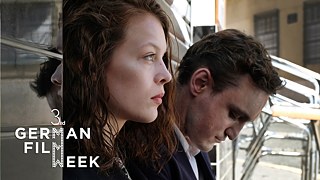Transit
3rd German Film Week
© Schramm Film
"Challenging but rewarding arthouse fare." – Boyd van Hoeij, The Hollywood Reporter
The German troops are just outside Paris. Georg escapes to Marseille at the last moment. His luggage contains the legacy of a writer named Weidel, who took his own life out of fear of persecution. This legacy comprises a manuscript, some letters and the Mexican Embassy’s assurance of a visa. Only those who can prove that they will leave are allowed in this port town, and this means you need an entry permit from a potential host country. Assuming the identity of Weidel, Georg tries to obtain one of the few scarce passages on a ship. Talks between refugees take place in the corridors of his small hotel, the waiting rooms of consulates, and the cafés and bars down at the harbour. Georg befriends Driss, the son of his late comrade Heinz, who died whilst trying to flee. But when he meets the mysterious Marie, his plans change.
"Transit" is based on Anna Seghers' eponymous novel which she wrote in exile. The film is set in contemporary Marseille where these characters from the past move around. And so, refugees from back then meet refugees from today, history meets the present, and all of their stories combine to create one eternal transit space.
Source: 68. Internationale Filmfestspiele Berlin (Berlinale Catalogue)
film reviews
Much has been said and written about the liberties that director Christian Petzold has taken in adapting Anna Seghers’s 1942 novel Transit for the screen — the crafty manner in which he has transposed Seghers’s World War II story into a contemporary setting, working with the main narrative of refugees coping with Nazi Germany in France but seen in the film with modern-day cars and infrastructure and clothes in Paris and Marseille — and true enough, this is where the brilliance of the film lies. It takes a while before it sinks in, before it makes sense and the risk of this approach finds its fulcrum. There is no mention of Hitler or Nazis (although soldiers are seen and the violence is palpable) but there is always a looming threat that the characters will get caught and killed, a sense that their lives are in danger, the kind of peril and intimidation that refugees up to now are experiencing. It is not that Petzold does not care about historical context and accuracy (in fact, Seghers’s novel is one of his favourite books, which proves to be the more daunting task). Having set the stifling atmosphere of unrest and anxiety in which people are forced to flee for their safety, he lays down bold arguments on the culture of racism and xenophobia in Europe that has persisted after the Second World War.Propelling the narrative of Transit is Georg (played with remarkable tenderness by Franz Rogowski) who escapes Paris and assumes the identity of a writer who has recently committed suicide for fear of persecution. This allows him to have some money and be given a visa to Mexico, but it is not the war that is stopping him from leaving France but the attachment to the people he meets along the way: a kid and his mother, the wife of the writer whose identity he has stolen, the persecuted folks driven to desperate decisions, even the streets of Marseille he has grown fond of over time. There are tense moments in Transit, particularly when Georg can no longer contain his secret, but generally it feels fleeting all throughout, as though the narrative was marked with lamp posts of uncertainty, filling the space with light and darkness. When it ends it gives the impression that it has only just begun.
- Richard Bolisay

Follow him on Twitter @richardbolisay.
Film details
Germany, France, 2018
Director: Christian Petzold
Genre: Drama, Melodrama
English subtitles
Duration: 102 mins
Rating: PG
